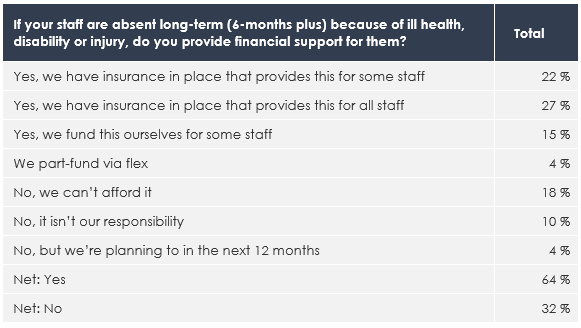The lack of financial support for long-term sickness is outlined in research from GRiD which confirms that a third of employers don’t have financial support in place for employees if absent for the long-term with a quarter of employees don’t know whether their employer offers financial support or not.
Thirty-two per cent of employers don’t have any financial support in place for staff if they are absent for longer than six months owing to ill health, disability or injury. Of these organisations, half claim they can’t afford to offer financial support and a third do not believe it is their responsibility, with 15% reporting that they fund financial support themselves rather than via an insurance policy such as a group income protection policy.
The findings are from a Group Risk Development (GRiD) survey* that researched how organisations support their staff.
Katharine Moxham, spokesperson for GRiD said: “It may seem counter-intuitive but employees who are offered financial support at difficult times in their lives feel more valued and are therefore likely to return to work more quickly when they are able. Removing an employee’s source of income is by no means a motivator to get them back at their desk, and nor should any employer be advocating presenteeism where employees return to work before they are truly ready.”
Leaving staff vulnerable
A quarter (24%) of employees don’t know whether their employer offers them financial support in the event of long-term ill-health or injury. A further 11% say their employer doesn’t provide any financial support. The fact that so many employees are unaware of any support could leave some employees vulnerable, as GRiD warns they may be under the impression that they have employer-sponsored financial protection if they need it, when in fact they don’t. If it’s offered, it’s important that staff are aware. Indeed, new legislation came into force 6 April this year requiring employers to inform new employees about their employment and benefits on day one, or on request for existing employees.**
Jamie Tuffield, who heads up the advo employee benefit team commented “This research lays bare the fact that employers can do more to support those staff who, through no fault of their own, have to take a break from work. A robust group risk policy needs to be an essential part of any employee benefit package and feature prominently.”
Jamie Tuffield, advo employee benefits lead.
Of the 15% of employers who choose to fund financial support for employees on a case-by-case basis, GRiD warns this can be problematic. As Moxham explains: “Employers can make assumptions, but it isn’t possible to accurately predict how many members of staff will need financial help from one year to the next, which makes it hard to budget. Not only that but funding any support on an individual basis is more expensive than having a pre-arranged policy in place.”
GRiD also warns that when employers make decisions on an individual basis, they risk creating inconsistencies in the treatment of staff. Although this may be unintentional, employers need to be wary of potential inequality or discrimination in their support processes. Financially supporting staff during long-term absence certainly engenders loyalty when employees see their colleagues being supported, however the opposite is also true if policies are deemed to be unfair or biased in the way support is allocated.
Moxham summed up the situation by adding: “Although some employers may believe that offering financial support, such as group income protection, is prohibitively expensive, in fact, it isn’t at all. The average cost is £313 per employee per year.*** Not only does it provide the employee with an income, and prevent unforeseen expenditure for the employer, it also supports the individual in returning to work, as group income protection policies typically come with a wealth of support for rehabilitation.”
Jamie from advo added “we are experts in helping design an apt benefit’s package that can benefit all employees and their employer too.”
If you would like to know more about how advo can support your organisation then why not email us at info@advogroup.co.uk to start a conversation.
Notes:
Research undertaken by Opinium on behalf of GRiD January 2020.
** The Employment Rights (Employment Particulars and Paid Annual Leave) (Amendment) Regulations 2018 (SI 2018/1378)
*** Swiss Re Group Watch 2020
You can read the press release in full from GRiD here.





